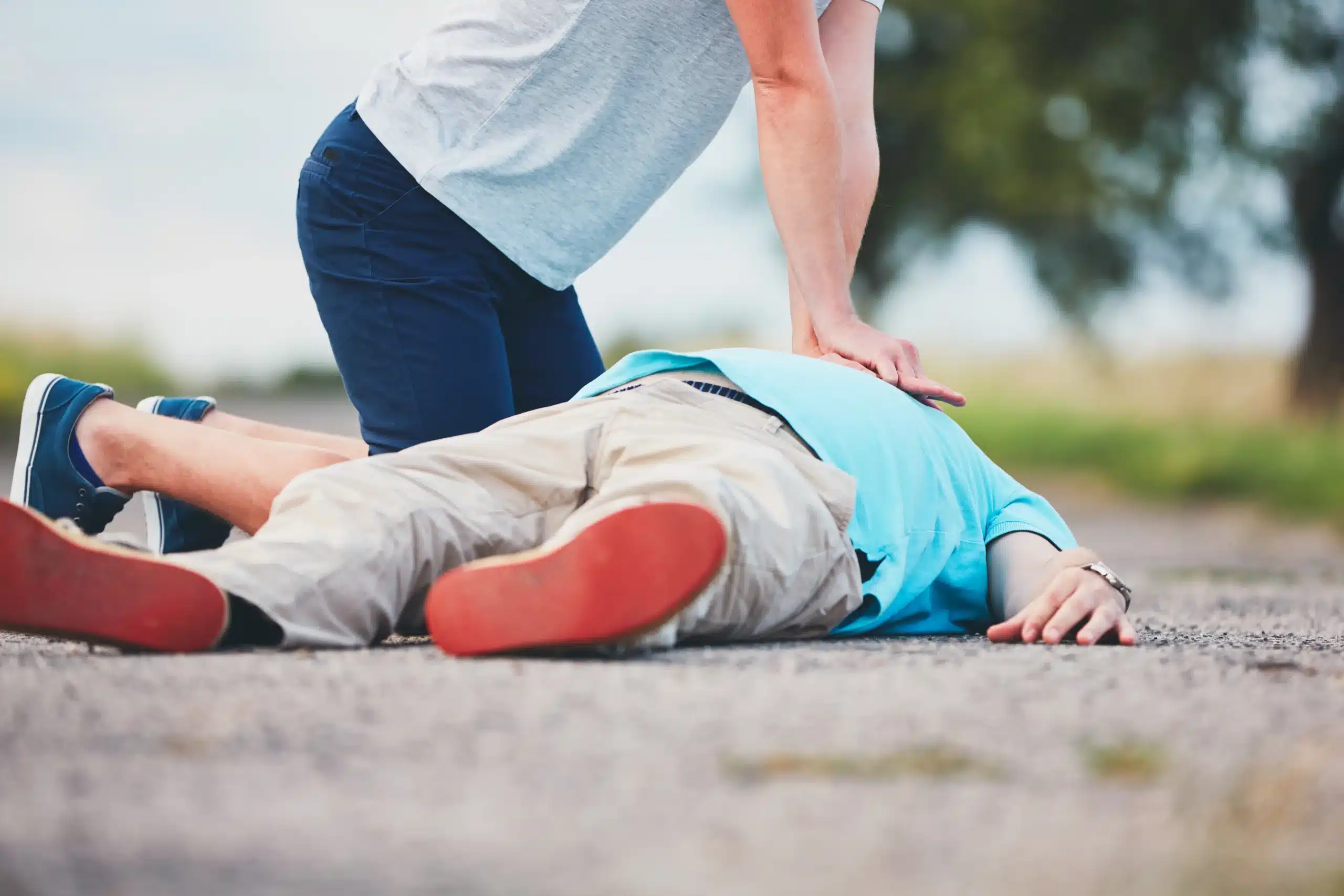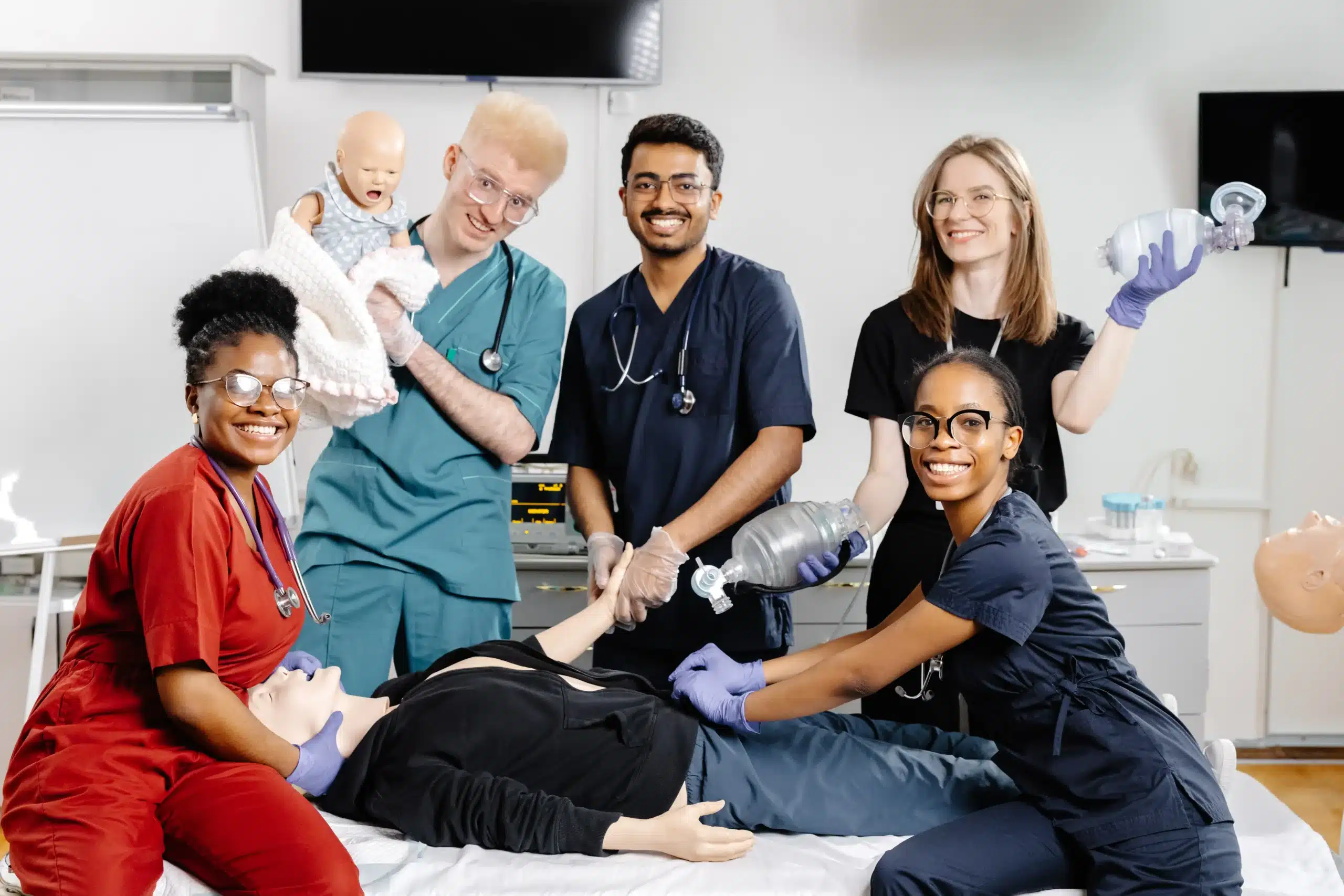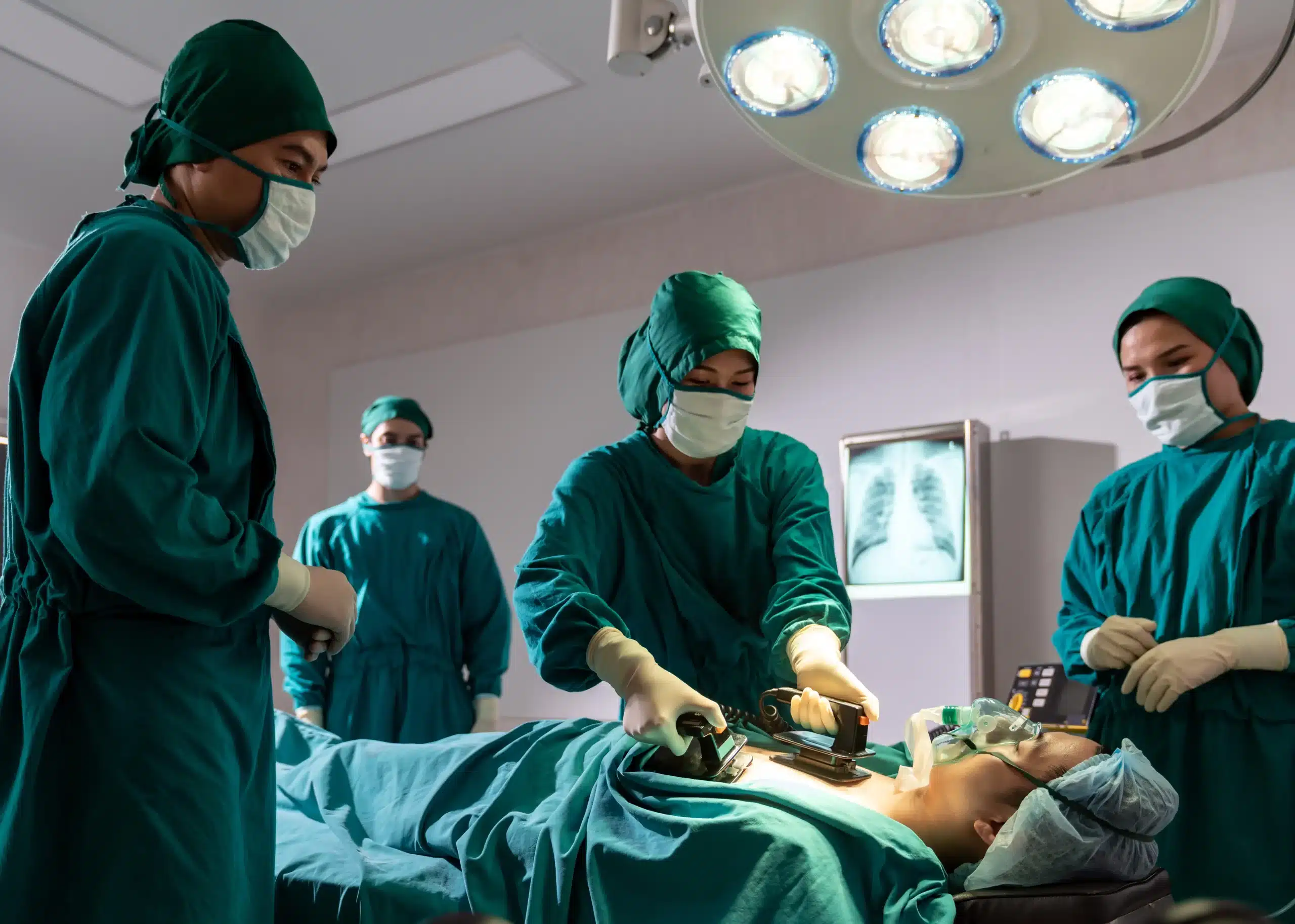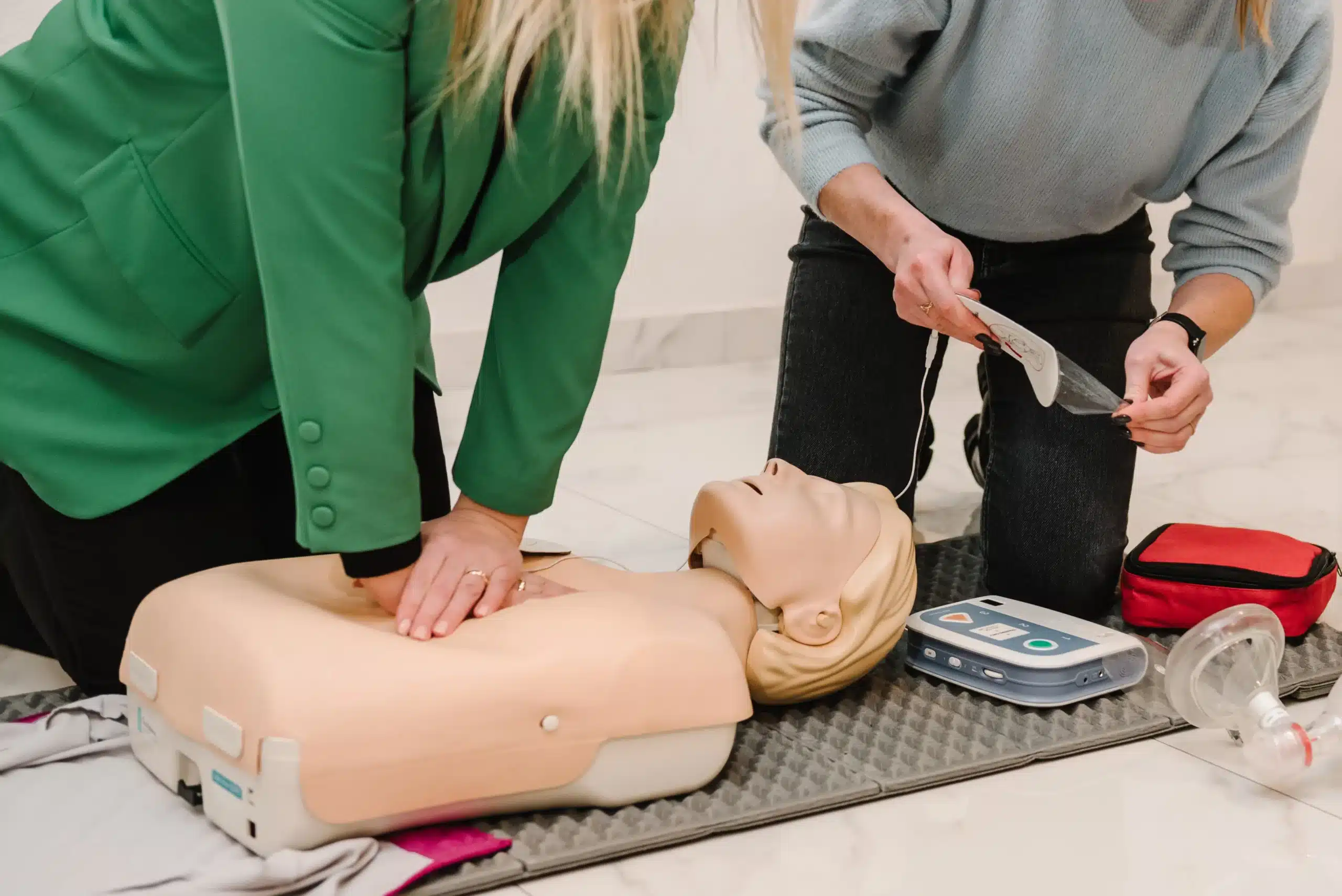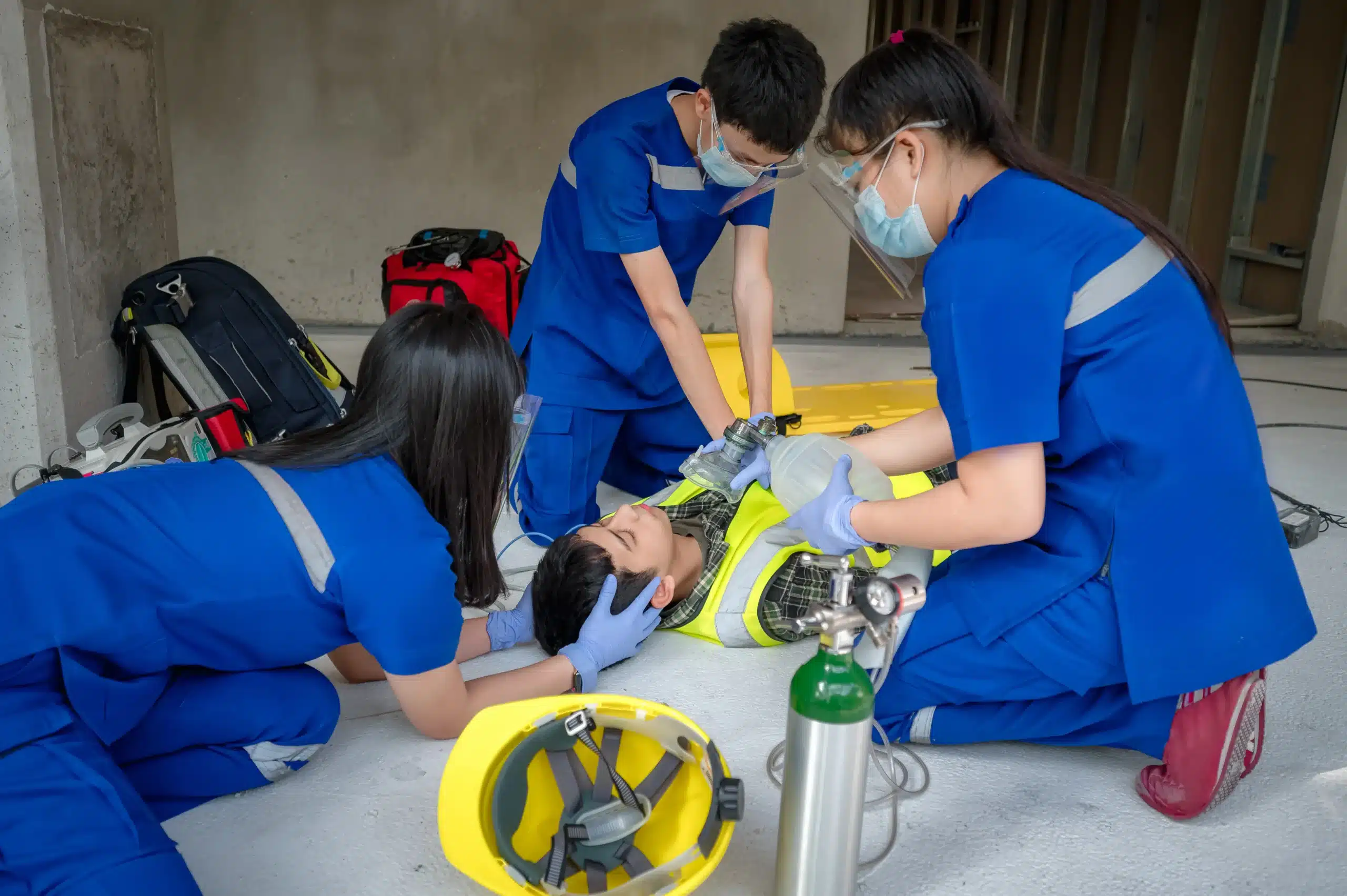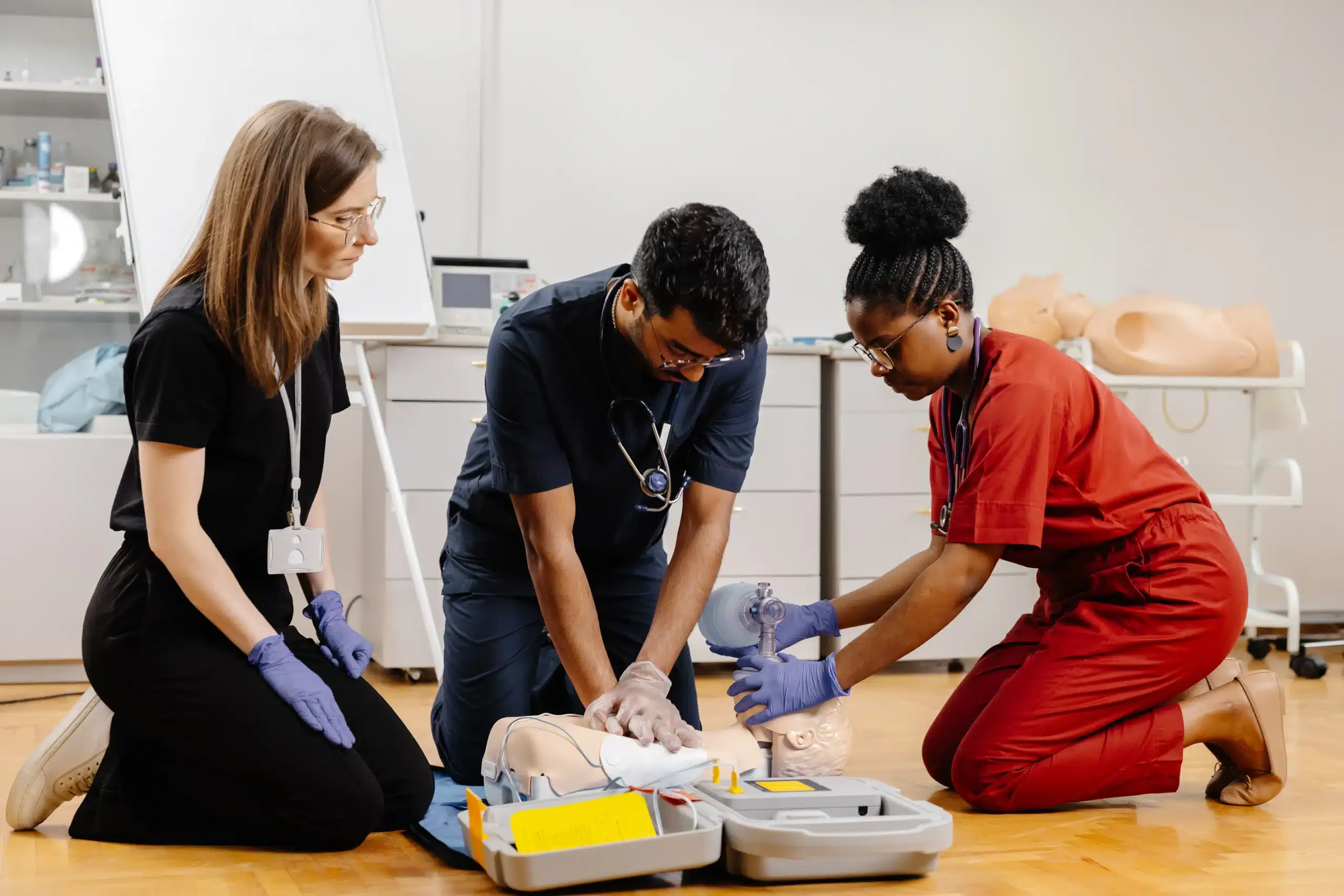Emergencies can happen anytime, anywhere. Would you know what to do if someone suddenly collapsed or a child started choking? Learning CPR and first-aid in Concord empowers you to respond confidently in such critical situations. This comprehensive guide breaks down everything you need to know about CPR and first aid, from understanding the basics to finding the right course in Concord and maintaining your certification. We’ll explore the different types of courses available, discuss the importance of certification, and debunk common myths about these life-saving skills. Get ready to equip yourself with the knowledge and confidence to make a real difference.
Key Takeaways
- CPR and first aid training are for everyone: These life-saving skills empower you to handle emergencies effectively, from minor injuries to life-threatening situations. Find a course format—in-person, online, or blended—that suits your learning style and schedule.
- Certification demonstrates preparedness: A CPR and first aid certification validates your skills and can be a valuable asset in various professions. Maintain your certification and refresh your skills regularly to stay prepared.
- Finding the right course is easy: Explore local resources, compare costs, and consider group discounts. Specialized courses are also available to meet specific needs, such as childcare or advanced medical training.
What are CPR and First Aid?
What CPR and First Aid Involve
CPR (Cardiopulmonary Resuscitation) and first aid are both emergency, life-saving techniques, but they address different situations. CPR is specifically for people who are unconscious and not breathing, or only gasping (cardiac arrest). It involves chest compressions and rescue breaths to circulate oxygenated blood to the brain and other vital organs. First aid covers a much broader range of medical situations, from minor cuts and burns to more serious injuries like fractures and choking. Learning basic first aid can help you stabilize someone until professional medical help arrives.
Why CPR and First Aid Skills Matter
Knowing CPR and first aid can truly make a difference in critical situations. These skills empower you to respond effectively during emergencies, potentially saving lives. CPR can help maintain blood flow to the brain during cardiac arrest, increasing the chances of survival until paramedics arrive. First aid skills allow you to address a variety of injuries and illnesses, preventing further harm and promoting faster recovery. Whether it’s a child choking or a coworker experiencing a sudden allergic reaction, your quick actions can significantly impact the outcome. Consider finding a local CPR class to gain these valuable skills. Safety Training Seminars offers a range of courses in Brentwood.
Debunking CPR and First Aid Training Myths
One common misconception is that CPR and first aid training are only for medical professionals. This isn’t true. These skills are valuable for everyone, from parents and teachers to office workers and community members. Another myth is that these courses are difficult and time-consuming. In reality, many organizations offer streamlined CPR and first aid courses that fit easily into busy schedules. Finally, some people believe they’ll never need to use these skills. While we hope you never face a medical emergency, being prepared can make all the difference if you do. Don’t let these myths prevent you from gaining the confidence and knowledge that comes with CPR and first aid training.
Find CPR and First Aid Courses in Concord
Finding the right CPR and First Aid course in Concord is easier than you think. With various options available, you can find a class that fits your schedule and learning style. Let’s break down the types of courses and where to find them.
Types of Courses Offered
- CPR (Cardiopulmonary Resuscitation): CPR is a life-saving technique used when someone’s breathing or heartbeat has stopped. Learning CPR empowers you to respond effectively in emergencies.
- First Aid: A First Aid course teaches you how to handle a range of medical situations, from minor cuts and burns to more serious injuries. It’s a valuable skill set for anyone.
- BLS (Basic Life Support): BLS certification is typically for healthcare providers and builds upon CPR and First Aid, adding essential skills for professional medical settings. Our Brentwood location offers BLS certification.
- ACLS (Advanced Cardiovascular Life Support): ACLS courses are designed for healthcare professionals who manage patients experiencing cardiac arrest or other cardiovascular emergencies. This advanced training covers complex algorithms and life-saving interventions. You can find more information about our ACLS courses.
- PALS (Pediatric Advanced Life Support): PALS certification focuses on the specific needs of infants and children facing medical emergencies. It’s essential training for healthcare providers working with younger patients. We also offer PALS certification at our Brentwood location.
Where to Find Courses in Concord
- Safety Training Seminars: Safety Training Seminars offers various CPR and First Aid courses tailored to different needs. Check their Concord location for more details. We also offer a range of courses at our Brentwood location.
- CPR Training Center: The CPR Training Center provides comprehensive training options, including CPR, BLS, and First Aid. Visit their website for information on schedules and registration.
- American Red Cross: The American Red Cross is a well-known provider of CPR and First Aid training. You can explore their course offerings and find a class near you. For those interested in American Heart Association courses, our blog has information on AHA courses in Concord.
- Local Community Centers: Many community centers in Concord offer CPR and First Aid classes, often at convenient times and affordable rates. Check with your local community center for upcoming courses.
- Hospitals and Medical Centers: Hospitals and medical centers frequently hold CPR and First Aid training sessions for both healthcare professionals and the public. Contact your local hospital for more information.
Choose Your Course Format
Finding the right CPR and first aid course format is key to successful learning. Think about your schedule, learning style, and comfort level with technology when making your decision. Here’s a breakdown of the most common options to help you choose the best fit for your needs.
In-Person Classes: Learn Hands-on
In-person classes offer a hands-on learning experience, ideal for those who learn best in interactive environments. You’ll practice techniques under the guidance of certified instructors, receiving immediate feedback and personalized attention. In-person training emphasizes this practical approach, ensuring students develop the skills and confidence to handle real-life emergencies. This format also allows for direct interaction with your instructors and classmates.
Online Courses: Learn at Your Own Pace
If you need flexibility, an online course might be a good choice. Learn at your own pace and fit the training around your schedule. Online CPR and first aid training typically takes a couple of hours to complete from anywhere with internet access. You’ll then complete your skills testing separately at a designated testing center to receive your certification.
Blended Learning: Combine Theory and Practice
Blended learning combines online learning with in-person skills practice. You’ll cover the course material online at your own pace, then attend an in-person session to practice your skills. This approach offers flexibility while still providing crucial hands-on training. Blended learning courses streamline the learning process, making it both efficient and effective. Skills sessions typically last about an hour, focusing on essential techniques like adult, child, and infant CPR, AED use, and bag valve mask techniques.
Typical Course Lengths
It’s helpful to understand the time commitment involved when choosing a course. A typical BLS training course takes between four and six hours, including lectures, demonstrations, and hands-on practice. This timeframe allows for thorough instruction and plenty of opportunity to hone your skills. The California Learning Resource Network offers additional information on CPR course lengths.
Practice and Get Assessed
No matter which format you choose, all reputable CPR and first aid courses include a practical skills assessment. This typically involves a one-hour session where you demonstrate your techniques to an instructor. This hands-on assessment is essential for building confidence and ensuring you’re prepared to respond effectively in a real emergency.
Register for a Course
Now that you know what course you need, let’s look at the practicalities of signing up. From understanding costs to preparing for your first class, here’s what you need to know.
Course Costs
Course costs vary depending on the type of certification. Basic CPR and First Aid courses typically start around $75, while more advanced certifications like ACLS and PALS can range from $150 to $250. Check with specific providers like Safety Training Seminars for their latest pricing. You can also compare prices with other training centers in the area, such as those listed in our Northern CA CPR Directory.
Group Discounts and Promotions
If you’re signing up with a group, ask about discounts. Many providers offer special rates for group bookings, making it more affordable to train together. This can be a great option for workplaces, community groups, or even a group of friends.
How to Register
Registering for a course is usually straightforward. Most providers allow online registration through their website. Some providers may also accept registrations over the phone or in person.
Age Requirements and Health Info
There are generally no age restrictions for learning CPR and First Aid. However, certain certifications, like the EMSA Child Care Health & Safety program, are specifically designed for individuals working with children. While there aren’t usually specific health requirements, it’s important to be able to physically perform CPR, which involves chest compressions and rescue breaths. If you have any concerns, discuss them with the course provider beforehand.
What to Bring and How to Prepare
Most courses provide all the necessary training materials. Comfortable clothing is recommended, as you’ll be actively participating in practice scenarios. Come prepared to learn and ask questions. The goal is to equip yourself with the skills and confidence to handle emergencies effectively, from minor injuries to more serious situations, as highlighted in this helpful First-Aid Training Guide.
Get Certified: Why It Matters
Getting certified in CPR and First Aid isn’t just about checking a box; it’s about equipping yourself with skills that can make a real difference. Whether you’re a healthcare professional, a parent, or simply someone who wants to be prepared, holding a certification carries significant weight.
Improve Your Safety Skills
First Aid training prepares you for a wide range of emergencies. Equipping yourself with these skills allows you to confidently handle various situations, from minor injuries like cuts and scrapes to more serious events, effectively bridging the gap until professional medical help arrives. For more detailed information, take a look at this guide on First Aid training in Concord.
Advance Your Career
For many professions, CPR and First Aid certifications are not just recommended—they’re often required. Holding these certifications demonstrates your commitment to safety and preparedness, making you a more valuable asset in fields like healthcare, education, and childcare. AHA certifications such as BLS, ACLS, and PALS can significantly enhance your career prospects and open doors to new opportunities. If you’re looking to advance your career, consider adding these certifications to your resume.
Save Lives
Learning CPR can quite literally be the difference between life and death. Even basic knowledge of hands-only CPR, which focuses on chest compressions, can significantly improve someone’s chances of survival during a cardiac arrest. These skills empower you to act quickly and decisively in critical moments.
Make Your Community Safer
The more people in a community trained in CPR and First Aid, the safer that community becomes. By getting certified, you contribute to a network of prepared individuals ready to respond to emergencies. Debunking common myths about CPR and First Aid encourages more people to seek training, creating a ripple effect of safety and preparedness. Consider getting certified—it’s a step towards building a more resilient and prepared community.
Maintain Your Certification
Keeping your CPR and first aid skills sharp is crucial for confidently responding to emergencies. Whether you’re getting certified for the first time, renewing an existing certification, or simply brushing up on your knowledge, this section will guide you.
Get Your First Certification
Taking that first step to get certified is important. AHA certification provides you with essential, life-saving skills. Whether you’re pursuing certification for personal enrichment or professional reasons, training in BLS, ACLS, PALS, CPR, and First Aid empowers you to handle emergencies. Learn more about these certifications and how they can benefit you on our American Heart Association courses page.
Renew Your Certification
Certifications expire, typically every two years. If your CPR certification is nearing its expiration date or has already lapsed, it’s simple to renew. Explore the CPR class schedules in Concord and find a convenient time to recertify. Staying current ensures you’re always ready to assist when needed.
Refresh Your Skills
Even with a current certification, refreshing your skills periodically is a good idea. Solid CPR training gives you the confidence to perform CPR effectively. Consider a refresher course to stay on top of the latest techniques and guidelines. Resources like this article on first aid myths and facts can also help reinforce your knowledge.
Find Specialized Courses
You might also consider specialized training beyond the basic certifications. Courses like PALS (Pediatric Advanced Life Support) or NRP (Neonatal Resuscitation Program) could be valuable depending on your career or personal interests. Explore the range of training options available in Concord, from standard first aid training to specialized certifications like PALS and NRP. For those involved in childcare, the EMSA Child Care Health & Safety course provides relevant training. We also offer group discounts to make training more accessible. For a complete list of CPR resources in Northern California, see our CPR directory.
Related Articles
- The Critical Role of CPR and First-Aid Training in the Workplace
- CPR Myths Debunked for Effective Life-Saving Skills
- CPR Training in Concord: Find Right Course for You
- CPR Classes in Concord: Your Complete Guide – Brentwood CPR Classes
- Online CPR Classes in Concord: Your Certification Guide – Brentwood CPR Classes
Frequently Asked Questions
What’s the difference between CPR and First Aid? CPR focuses on reviving someone whose heart has stopped or who isn’t breathing. First aid addresses a wider range of injuries and illnesses, providing initial care until professional help arrives. Think of CPR as a specific tool within the larger toolkit of first aid.
How do I choose the right CPR and First Aid course format? Consider your learning style and schedule. In-person classes offer hands-on practice and direct interaction with instructors. Online courses provide flexibility, allowing you to learn at your own pace. Blended learning combines online coursework with in-person skills sessions.
How much do CPR and First Aid courses cost? Costs depend on the type of certification and the course provider. Basic CPR and First Aid courses are generally more affordable than advanced certifications like ACLS and PALS. Check with different providers for pricing and ask about group discounts.
How often do I need to renew my CPR and First Aid certification? Most certifications are valid for two years. It’s essential to renew your certification before it expires to maintain your skills and credentials. Even with a current certification, periodic refresher courses can help keep your knowledge and skills sharp.
What if I have physical limitations? Can I still learn CPR? While CPR does involve physical actions like chest compressions, modifications can often be made to accommodate certain limitations. Discuss any concerns you have with the course provider beforehand. They can offer guidance and suggest adjustments to help you successfully complete the training.


